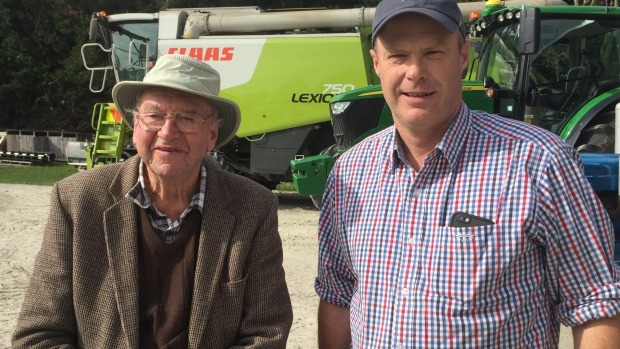Author Pat Deavoll, NZFamer.co.nz

For Jim (left) and Chris Dennison, irrigation means viability, sustainability and security for their arable and dairy operation.
Farmers talk about growing feed, but North Otago crop and dairy farmer Chris Dennison says he is “harvesting sunshine.”
His world record-breaking crops of barley and oil seed rape were the combination of heavy soils, a coastal environment, reliable water and sustained sunshine, he said.
“Here at Hilderthorpe (just south of the Waitaki River) we get a cool easterly wind which gives a lull in the growing season for cereal and oil seed rape, so the crops can utilise more sunshine.”
Dennison took over the farm from his father Jim in the early 1980s. Traditionally it was a mixed sheep and beef property but when Dennison arrived home he brought with him an interest in cropping.
Consequently, by 1999 the farm had re-invented itself into separate units as dairy and arable operations. These days the 750 cow dairy farm is managed by a 50:50 share milker.
“My passion is really in arable farming,” Dennison said “In the 1990s a UK agronomist visited New Zealand and said ‘we could do a lot better’. ‘You have the best climate in the world so why aren’t you growing the best crops’? Over a few seasons, he taught us agronomy methods that allowed us to do just that.”
In hindsight back, then I wasn’t really harnessing irrigation,” Dennison said. “I was carrying on the same practices as before, but just adding water. I was irrigating to ward off drought.”
Today he feels he is continually learning how to harness water and manage nutrient, genetic and plant protection programmes better.
Hilderthorpe had lifted its game, he said.
Irrigation has allowed Dennison to expand the operation, create some scale and invest in better technology. He uses precision farming technology; for example a GPS auto-steer on the tractors, accurate to within two centimetres, and a combine harvester that maps yield in real-time. This can be dialled up on Dennison’s cellphone.
“Environmentally we can target our inputs because we know within a few per cent what our potential yield will be. We don’t waste any fertiliser or leach nutrients. The Overseer fertility programme shows loss outputs of only two kilograms per hectare on a very intensive irrigated regime.”
Dennison holds two world records for crop production; the Guinness world record for highest yield in wheat in 2003; and in the January 2015 harvest, the world record for oil seed rape. He was also the recipient of the FMG Farm Excellence Awards in 2005.
“We’ve spent half our farming life building up fertility and organic matter and utilising water so the paddocks that only took two tray loads of sheaves are now world class,” he says.
“For us, irrigation means viability, sustainability and security. A small area of the farm is dry and this yields five tonnes per hectare compared with a yield of 11 tonnes per hectare for the irrigated crops.
“I would be in a huge hole if not for the high yields I’m able to maintain because of irrigation.”
Dennison is director of the Waitaki Irrigators Collective, the overarching body for irrigation schemes in the district and chairman of the Lower Waitaki Irrigation Company.